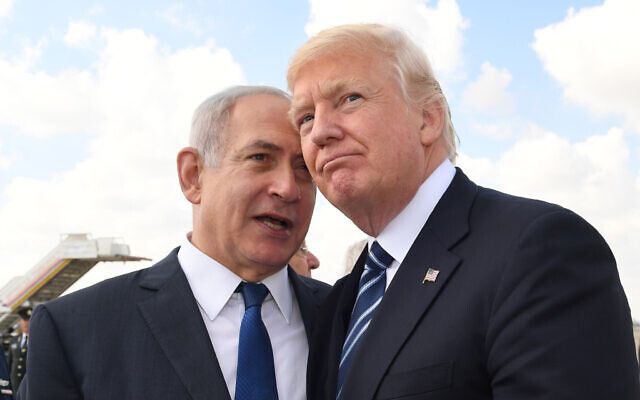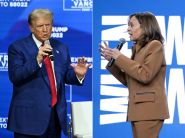- Home
- US Elections
- Trump May Reassess US Military Aid to Israel

Israeli Prime minister Benjamin Netanyahu and Republican candidate Donald Trump ©Mondafrique
If Donald Trump returns to the presidency in 2024, United States foreign policy is likely to shift toward isolationism, which may drive traditional American allies, especially Israel, to explore diplomatic alternatives.
A potential Donald Trump presidency in 2024 would likely represent a sharp departure from the current Biden administration’s foreign policy approach. Reviving the “America First” slogan, this strategy would prioritize US national interests, scale back military involvement abroad, and rely on assertive nationalism and unilateral action. The focus would be on realigning US alliances and international commitments according to domestic priorities. Approximately 70% of his administration’s efforts could thus be directed toward domestic issues, including reducing federal power and tackling what he terms the “deep state.”
The legacy of the Carlson-Vance doctrine
A potential Trump presidency could be heavily influenced by conservative figures like Tucker Carlson and JD Vance. Carlson, a journalist with 14 million followers on X, and Vance, the Republican vice-presidential candidate, are both strong proponents of a restrained foreign policy and outspoken critics of US military interventions abroad.
In anticipation of his presidential candidacy in 2028, every move by Vance, a prominent contender for the Republican nomination, will be guided by long-term strategies aimed at appealing to a generation of increasingly pacifist voters who support the "America First" agenda. With his influence and dynamism, Vance is well-positioned to play a key role in shaping Trump's foreign policy doctrine.
This vision, advocating for greater autonomy among US partners, could encourage them to pursue diplomatic solutions. However, the proposal to reduce military assistance may encounter resistance from internal opponents, especially interventionist hawks like Pompeo, Cotton and O’Brien, who favor robust support for Israel.
The end of the agreement with Iran
Trump seems determined to rule out any prospect of returning to the Iran nuclear deal (JCPOA), choosing instead to pursue “automatic sanctions” and increased pressure to push Tehran toward a new negotiation framework. However, this approach may clash with the isolationist doctrine advocated by Carlson and Vance, who are wary of military interventions. Internal tensions may therefore arise, especially if more aggressive measures toward Iran are considered.
Regionally, Trump may seek to strengthen normalization agreements between Israel and Arab countries, particularly Saudi Arabia. However, achieving ambitious agreements could be hindered by insufficient support in Congress. Meanwhile, Israel might leverage the transition period before Trump’s inauguration to ramp up its regional operations, particularly in Lebanon and against Iran.
Ukraine: support that needs redefining
Trump's strategy regarding Ukraine may involve pushing for a faster resolution to the conflict, potentially requiring concessions from Kyiv. By urging European nations to enhance their own defense capabilities, Trump could contemplate reducing US aid to Ukraine unless allies increase their contributions. His strained relationship with the North Atlantic Treaty Organization (NATO) suggests he might apply renewed pressure on European partners, risking friction within the alliance. Advisors aligned with Carlson and Vance may support this approach, while others could raise concerns about its implications for regional stability.
Trump's approach to federal bureaucracy may lead to cuts in strategic agencies like the State Department and intelligence services, with the goal of diminishing their influence and fostering a more transactional style of diplomacy. However, officials within the defense and intelligence communities may resist these changes, arguing they could undermine counterterrorism and cybersecurity efforts. Additionally, Trump's inclination to reduce US involvement in international crises, such as in Ukraine, may raise concerns about destabilization among his advisors.
China at the forefront of concerns
In response to China, Trump’s policy is likely to focus on bolstering US economic and military strength through actions like raising trade barriers and ending certain trade privileges. Efforts to build stronger alliances in the Indo-Pacific region may also intensify. However, internal opposition could arise, with some voices advocating for restraint to avoid damaging economic repercussions.
If Trump wins the presidency, his foreign policy could shift toward prioritizing domestic interests and scaling back US involvement internationally. However, this vision may encounter institutional pushback and complex regional dynamics, especially during the transition period, when allies like Israel might look to secure their interests before his term officially starts.
Vance's positioning for a potential presidential run in 2028, advocating for restraint and prioritizing national interests, is likely to add another layer of influence on Trump’s foreign policy direction.
Read more



Comments